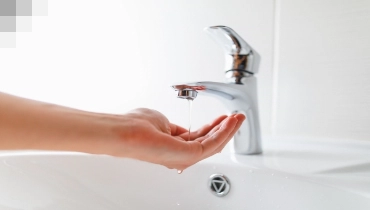
Dealing with low water pressure in your house can be a frustrating situation, and it can make everything from doing laundry to taking a shower more time-consuming and stressful than it should be. There are many possible causes for low water pressure, depending on your water source and plumbing system configuration. Here’s how to determine what’s causing your pressure problem and techniques to fix it.
What Causes Low Cold Water Pressure?
There are several possible causes of low water pressure, ranging from simple fixes to repairs requiring a bit more time and effort. Some of the most common reasons for low water pressure include:
- Partially-closed shutoff valves. A partially closed shutoff valve is the first item on our list because it’s the easiest issue to check for and resolve! In some cases, the shut-off valve either to the fixture in question or to the entire house may be partially closed. Turning closed a shutoff valve will always reduce waterflow to the area. Simply twist the valve counterclockwise to see if it will open any further, and then see if the water flow has improved.
- Debris and buildup in your plumbing pipes. If you’ve found that the pressure has gotten worse over time, debris or mineral buildup is a likely reason. This can take the form of dirt and debris collecting in the pipes or growing mineral deposits could be choking water flow if you have hard water. In cases that aren’t too severe, you can purchase a chemical solution to pour into your pipes to break up the deposits and help flush debris away. In extreme cases, your local plumber will need to replace sections of pipe to get the water flowing again.
- Deteriorating or leaking pipes. Over time, the constant stress of water rushing through plumbing pipes can deteriorate them, which can lead to water pressure problems. In addition, leaks, even slow ones, can reduce your water pressure. Water leaks inside the house can cause many other problems, including pest infestation and even structural damage.
- A failing pressure regulator. If you have a water pressure regulator as part of your plumbing system, it’s worth testing it to make sure it’s still functioning correctly. Your local plumber can help you test and repair your pressure regulator or install a new one for you.
- Incorrectly-sized plumbing pipes. If you’ve recently had new pipes installed and are now dealing with low water pressure, it’s possible that those pipes aren’t the right size for the job. Ask another plumber to take a look at the installation and provide a second opinion.
Related Topic: How to Test Water Pressure at Home
Can a Hot Water Tank Cause Low Water Pressure?
The most probable source of low hot water pressure (and the most common cause of sudden low water pressure) is the hot water tank. It’s worth having yours checked if you’ve tried other ideas and you’re still having water pressure issues. There are a few ways in which a hot water tank can cause low water pressure, including:
- Mineral buildup in the pipes and tank.
- Sediment collecting in the bottom of the hot water tank.
- Kinks or other damage to the hoses or pipes that lead to and from your hot water tank.
- A faulty shutoff valve.
Related Topic: Do I Need a Water Softener?
Let an Expert Resolve Your Low Water Pressure Problem
After reading this article, you should have some ideas on how to identify the common culprits that could be causing your low water pressure. However, even if you identify the source of the problem, fixing it may require the help of a professional. If low pressure has you feeling down, your local Mr. Rooter can help. Our plumbing maintenance program can help identify and fix problems with your plumbing, including low water pressure. Give us a call or request an estimate online today.

